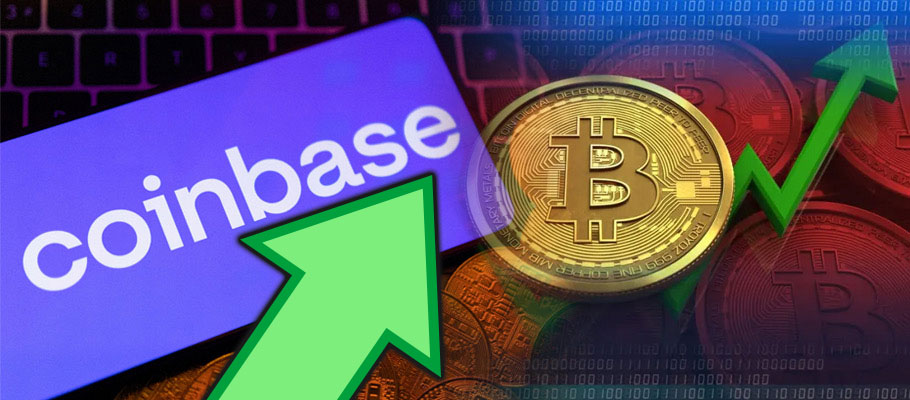
Published: November 13th, 2024
As Bitcoin's post-election surge continues to reach new records, key players in the crypto ecosystem are reaping rewards. While the world’s top digital currency punched through USD 89,500 on Monday 11th November, America’s leading crypto exchange, Coinbase (COIN: NASDAQ), saw its stock price rise sharply.
Data from Google Finance show that the San Francisco-based firm’s shares closed at USD 334.3 on Monday, 11th November. At time of writing the price had fallen back to USD 319.13, though still up 60 per cent over the last 30 days.
Over the previous 24 hours COIN had leapt by 20 per cent. All told, Coinbase could be within reach of the stock’s debut price of USD 381, hit three years ago when the company first went public during the last BTC bull run.
Data from TipRanks show that analysts are now looking for a price target of close to USD 380 over a the coming 12-months, with nine experts calling COIN a ‘buy’ while eight label it a ‘hold’.
The company makes it easy for novice and experienced traders to buy and sell major crypto coins and tokens. It also provides custody services to major spot Bitcoin ETF issuers, including Wall Street giants like BlackRock.
On the back of Donald Trump’s US election win last week, expectations for a crypto-friendly regulatory period, sent the stock into liftoff mode.
In June 2024, Coinbase said that it had implemented an advanced machine learning (ML) model capable of predicting activity spikes and automatically scaling network resources to address them. The exchange hopes this will prevent the downtime issues that have plagued it during traffic surges and extended periods of volatility.
‘Attempting to scale up resources when traffic is already underway is difficult and usually too late,’ Coinbase wrote in a blog post announcing the change. ‘In response to past outages and slowdowns we’ve developed a scaling solution that uses machine learning to anticipate rising traffic and automatically adjust, initiating a scale up before any surge in activity hits.’
Coinbase says its ML model has already helped smooth the trading experience during recent bouts of crypto market volatility.
‘As traffic ballooned, our scaling solution had already responded, doubling every few hours and staying one step ahead of peak traffic,’ Coinbase said. ‘The solution automatically scaled up and down in sync with trading and transaction volume. That continued until volatility decreased and no more scaling was required.
The model is designed is to give Coinbase at least an hour's lead time on any traffic surge. The exchange experimented in the past with a forecasting model that tried to anticipate traffic levels 60 minutes into the future. However, lag time in processing the underlying metrics made the tool ineffective.
The company says its new model is built to achieve a balance between avoiding missed spikes and reducing false alerts. It re-thought the problem and decided to focus on longer-term classification of activity types and market signals, including price fluctuations in major coins like Bitcoin and Ethereum.
In June, Coinbase, Ripple and VC Andreessen Horowitz (a16z) made moves to reduce a different kind of risk when they announced donations of USD 25 million each to Fairshake, a political action committee (PAC) dedicated to advancing crypto-friendly policies in the upcoming US general election.
The PAC's war chest now totals roughly USD 160 million, ready to be splashed out on candidates who support digital assets. That makes it one of the biggest stockpiles of campaign cash in American politics.
Fairshake and its affiliate PACs have been combing through US state primaries to identify candidates for the Senate and House of Representatives who've either been crypto-curious in the past, or let it be known recently that they would be open to considering pro-crypto positions.
The committees have cumulatively handed some otherwise low-profile politicians millions in campaign support. Given its size, Fairshake is considered a ‘Super PAC,’ with pockets deep enough to fund national political advertising spots for (or against) specific candidates. PACs are restricted, however, from playing a direct role in the candidates' official campaigns.
‘Our mission is to promote economic freedom by expanding the adoption of cryptocurrencies,’ Coinbase said in a statement announcing the donation. ‘We have been deeply engaged in policy discussions with the House and Senate with the aim of guiding crypto legislation and informing members about the issues. We see growing the number of pro-crypto decision makers in Washington as a vital activity.’
Regulation remains a barrier for the crypto industry as it seeks to establish itself in the financial mainstream. By gaining political support, it's hoped that it could lead to greater investment from traditional finance and more consumer use of digital assets.
In recent months many US lawmakers have had a change of heart towards crypto and warmed to its wider acceptance. Once the dust has settled from Trump’s resoundingly successful second presidential bid and Republican control of the congress, a raft of state and Federal legislation is expected that will establish clear rules for the use of digital assets.
Further south, Crypto and politics overlapped in November of last year when keen Bitcoin advocate Javier Milei won the election for President of Argentina.
Milei secured close to 60 per cent of the popular vote. Referring to his campaign theme of 'rebuilding Argentina,’ Milei has said that the country’s traditionally high rate of inflation paired with a rapidly declining peso indicated that 'the time for gradual measures is past’. He promised to lead a program of economic shock therapy. Thus far it seems to have brough t benefits, reducing rents in the country's largest city and delivering the country’s first balanced budget in 20 years.
Milei is enthusiastically pro-crypto, saying that Bitcoin harkens back to the days when the private sector was in charge of currency issuance.